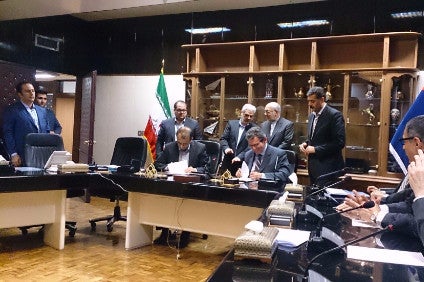
PSA Groupe and Iran Khodro have inked the final joint venture agreement to produce vehicles in Iran, with Tehran’s Industry Minister recently confirming to just-auto the deal mandated a minimum level of local content, with this eventually doubling.
“Peugeot will go up to 80% – it will start with 40% local content [and] go to 80%,” Iran industry minister, Mohammad Reza Nematzadeh, told just-auto on the sidelines of last week’s International Economic Forum (SPIEF) in St Petersburg.

Discover B2B Marketing That Performs
Combine business intelligence and editorial excellence to reach engaged professionals across 36 leading media platforms.
“Yes, we anticipate [that will apply to all automakers].”
The 50/50 PSA-Iran Khodro joint venture is expected to invest up to EUR400m (US$451m) during the next five years in manufacturing and R&D capacity.
The finance will see a manufacturing base for producing, launching and marketing Peugeot 208, 2008 and 301 models.
“Today marks a crucial milestone in our project with Iran Khodro,” said PSA Groupe EVP Middle East & Africa, Jean-Christophe Quémard.
“The two partners conducted discussions as announced during President Hassan Rouhani’s visit to Paris in January this year.”
The agreement provides for:
• The creation of a joint venture on an industrial site in Tehran to produce new generation Peugeot vehicles on a platform, which will also be used by Iran Khodro to develop its own models.
• The capacity to export joint-venture products across the region.
• The restoration of contractual relations for the production of Peugeot-branded vehicles currently sold in Iran.
The first vehicles will exit the production line at the Tehran plant in the second half of 2017.
The Iranian market reached a peak of 1.6m vehicles in 2011, with PSA estimating it should regain this level and reach 2m vehicles a year by 2022. Current estimates put the number of Peugeot cars on the road in Iran at more than 4m.
The French automaker says Iran is a key component of its development strategy in the Middle East & Africa region, which is the PSA Group’s third-fastest growing international market.
“Yes, we are negotiating with several [car] companies and they are all welcome,” added Nematzadeh. “We would like to get contact to [the] international market and renew our technology.
“We are looking to export our cars and also our car parts. I think we have concluded an agreement with companies from Germany and France, with Swedish companies [for example], for heavy trucks and buses.
French association, FIEV and Scandinavian entity, FKG are among supplier lobby groups which have already trodden the road to Tehran.






